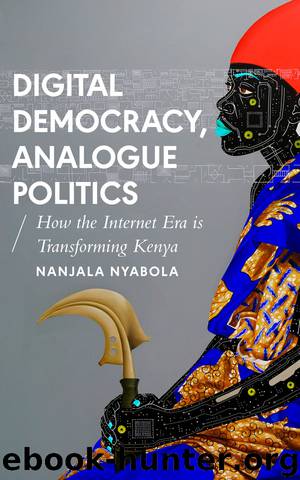Digital Democracy, Analogue Politics by Nanjala Nyabola

Author:Nanjala Nyabola
Language: eng
Format: epub
Publisher: Zed Books
Published: 2018-06-14T16:00:00+00:00
Today, digital platforms are integral to the radical feminist resurgence in Kenya. Digital platforms have been used to advocate for more women commentators on television and in print (#SayNo- ToManels). Women have organised around advocacy for the implementation of gender quotas contained in the constitution (#WeAre52Pc). Over the last ten years, new media has become a space for voices the mainstream would rather not hear to be able to loudly voice discontent over the country’s patriarchal public sphere and to recast women as more than just mothers or mothers in waiting. Where traditional media resists expanding women’s identities beyond their reproductive capacities – sexualising news readers, denying women airtime save for instances where they are speaking about their roles as women or mothers – social media has allowed women who want it to cultivate public identities that are relatively autonomous from their biological gender. New media has offered a space where women can be funny, witty, creative, political or whatever they choose to be in public.
Women’s private and public lives are multifaceted. In Kenya, women’s labour has been exploited both in and outside the home while keeping them underpaid and unprotected. Most of Kenya’s massive domestic labour force is women who are often subject to sexual assault and abuse from their employers. Kenyan women are significantly underrepresented in politics, and work less in formal wage employment even though most of Kenya’s small businesses are owned by women.15 The government itself has taken advantage of women’s entrepreneurial interests to encourage them to work in Gulf States with deplorable human rights records.16
Deeply embedded ideas of identity and belonging can doubly marginalise women. Ethnic identities especially can reinforce the patriarchy while erasing women’s human right to determine how they choose to identify. Women bear the burden of their ethnic identities in the obligation to expand the family through childbirth only to have their own ethnic identities erased almost completely through marriage. Kenyan women are often told that they are born a visitor– a woman’s family home is a merely a transit point before she gets to her ‘true home’ with her husband. This alienating consciousness has created vulnerabilities for women, including in relation to domestic violence, where it is not uncommon for abused women to be returned to abusive partners because they ‘no longer have a home’ with their birth families.
The offline women’s rights movement in Kenya has floundered when it comes to pushing back against these challenges. Even recognising that women’s struggles are disparate and that different ethnic or racial groups have different ways of understanding the role of women in public life, there are enough cross-cutting themes and issues for a coordinated women’s movement to emerge. It hasn’t. Issues like female genital mutilation have managed to build significant momentum, but these practices are not universal across ethnic groups. In the public sphere they are often discussed as niche subjects that only affect specific groups. Meanwhile, issues like domestic violence or political marginalisation – alarmingly common for all women, all ages, all
Download
This site does not store any files on its server. We only index and link to content provided by other sites. Please contact the content providers to delete copyright contents if any and email us, we'll remove relevant links or contents immediately.
The Secret History by Donna Tartt(19037)
The Social Justice Warrior Handbook by Lisa De Pasquale(12183)
Thirteen Reasons Why by Jay Asher(8887)
This Is How You Lose Her by Junot Diaz(6873)
Weapons of Math Destruction by Cathy O'Neil(6263)
Zero to One by Peter Thiel(5784)
Beartown by Fredrik Backman(5734)
The Myth of the Strong Leader by Archie Brown(5495)
The Fire Next Time by James Baldwin(5429)
How Democracies Die by Steven Levitsky & Daniel Ziblatt(5211)
Promise Me, Dad by Joe Biden(5141)
Stone's Rules by Roger Stone(5080)
A Higher Loyalty: Truth, Lies, and Leadership by James Comey(4947)
100 Deadly Skills by Clint Emerson(4917)
Rise and Kill First by Ronen Bergman(4776)
Secrecy World by Jake Bernstein(4739)
The David Icke Guide to the Global Conspiracy (and how to end it) by David Icke(4699)
The Farm by Tom Rob Smith(4501)
The Doomsday Machine by Daniel Ellsberg(4483)
